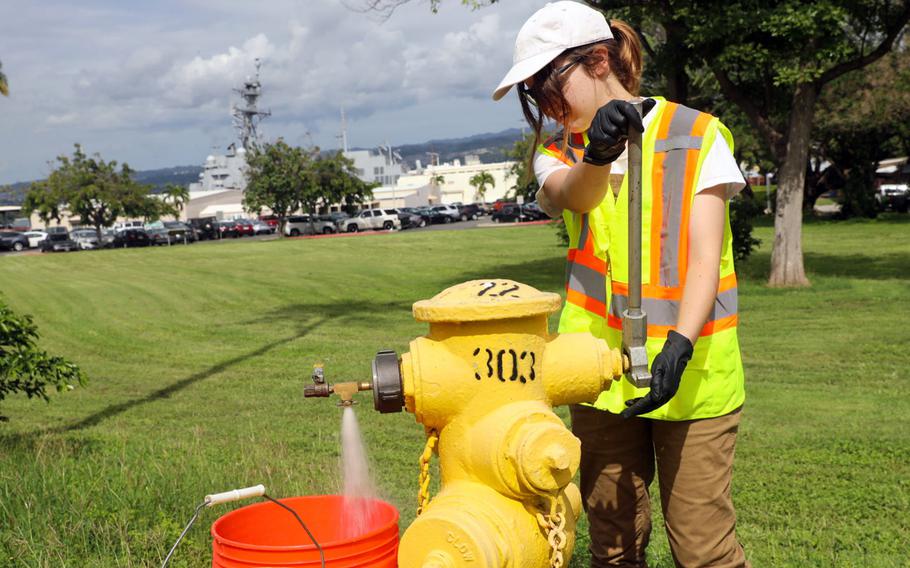
A contractor opens a fire hydrant to collect samples as part of the Navy's drinking water monitoring program at Joint Base Pearl Harbor-Hickam, Hawaii, Jan. 31, 2024. (Krystal Diaz/U.S. Navy)
Navy Installations Command has expanded its role in overseeing and evaluating the service’s drinking water systems at all bases in the United States and its territories, the service said in a news release Tuesday.
“Historically, various Navy commands managed their specific water systems,” the release states. “In order to ensure consistent management, policy, and oversight across the Navy, these functions and responsibilities were placed under [Navy Installations Command].”
The Navy Installations commander, Vice Adm. Scott Gray, approved the new policy, which was implemented Feb. 2. He is also the Navy’s executive agent for management of Drinking Water Ashore, according to the release.
The safety and monitoring of Navy water has drawn public scrutiny after a jet fuel leak in Hawaii in late 2021 contaminated the system that provided tap water to roughly 93,000 residents of military housing communities on and near Joint Base Pearl Harbor-Hickam.
Hundreds of residents and former residents affected by the contamination have sued the Navy in federal court, alleging the service did not adequately inform them about the tainted water.
It will take years to restore the soil and aquifer around the Red Hill Bulk Fuel Storage Facility contaminated by that leak and many more in previous decades.
The Environmental Working Group, a nonprofit advocacy group that promotes the use of fewer chemicals in agriculture, said in a 2020 report that tap water or groundwater at 328 U.S. military installations showed the presence of PFAS, a “forever” chemical used in a plethora of products since the 1940s.
Navy installations in Washington, Virginia, Pennsylvania and Florida were cited in that report.
Pearl Harbor lessons
The Navy’s news release Tuesday did not refer to water quality at any particular installation as being the genesis for the new policy.
The policy was implemented to standardize oversight, assessment, operation and maintenance at all Navy facilities, Coleen San Nicolas-Perez, a spokeswoman for Navy Installations Command, told Stars and Stripes by email Tuesday.
“There are lessons learned incorporated as a result of the [Joint Base Pearl Harbor-Hickam] drinking water concerns, but it also includes assessments and recommendations from systems across the Navy,” she said.
“We take program assessments seriously and by evaluating our programs and procedures we can then make necessary improvements to include implementation of a new or updated policy,” she said.
The new policy sets up a framework for operating and maintaining the drinking water systems.
Most prominently, it establishes drinking water committees at the installation, region and headquarters levels to ensure water quality management and proper handling of any deficiencies or problems, the news release states.
“We must consistently validate that those who rely on the Navy water systems, whether they are on our bases or live in nearby communities, have access to safe drinking water,” Gray said in the release.
“This policy identifies the responsibilities and roles of Navy commands and positions of authority while holding them accountable to deliver quality drinking water that meet standards,” he said.
Annual self-assessments
The committees will include public works, environmental, medical and communications personnel, according to the release.
They are tasked with “frequent communication with Navy and non-Navy stakeholders and consumers, providing water quality updates as needed, issuing public notifications of drinking water compliance concerns as required, and ensuring personnel are trained to operate and maintain the drinking water systems,” the news release states.
Committees will be chaired by the region commanders and installation commanding officers.
“The commanders are responsible for the quality assurance and compliance of the Navy drinking water systems,” Brock Durig, environmental director for Navy Installations Command, said in the release.
“They take a hands-on approach when it comes to continual program and water system oversight to address any water quality concerns and take the appropriate actions to ensure Navy drinking water systems are meeting federal and state standards,” he said.
Under the new policy, the command is required to oversee annual self-assessments by all installations of their compliance with federal, state and local drinking water regulations, according to the policy.